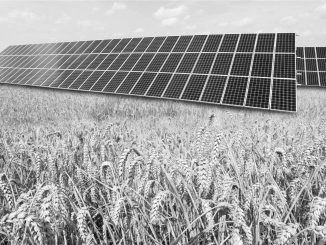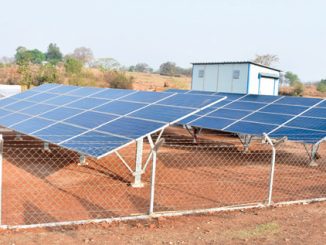
Orb Energy was incorporated in 2006, with funding from a UK-based venture capital firm. The company first targeted the distributed off-grid solar market in India, starting off as a provider of solar water heating and pumping systems. It gradually expanded into the rooftop solar space, which now constitutes over 70 per cent of Orb Energy’s business. The company uses an innovative financing model to deploy rooftop solar systems and has over 40 MW of installations. Its customer base consists largely of small and medium enterprises (SMEs).
Growth journey
For six to seven years after its inception, Orb Energy targeted only rural to semi-urban consumers for the sale of distributed solar photovoltaic (PV) products such as solar water heaters. The company built an extensive network to reach customers in small towns and villages and worked with banks for financing rural solar projects.
“We saw that there was a good market, but there were still some issues that we faced,” says Damian Miller, chief executive officer, Orb Energy. Under the Jawaharlal Nehru National Solar Mission (JNNSM), a few subsidies were introduced that were actually detrimental to the growth of the segment. Several banks that were already working in the solar off-grid segment, such as Citibank and Canara Bank, exited the space as they did not want to manage the subsidies. “So we saw that on the off-grid solar PV side things got difficult after the JNNSM,” he adds. The solar water heating segment too had a 30 per cent capital subsidy provision under the JNNSM. While this gave a boost to the market, the developers faced a long delay in receiving subsidy reimbursements, creating a working capital issue for many companies, including Orb Energy.
The government ultimately withdrew these subsidies. Despite this, from 2011 onwards, it became increasingly difficult to operate in the distributed solar power space. On the positive side, the module prices declined significantly from Rs 160 per watt to almost Rs 25 per watt, over a 10-year period. “A significant change took place in the cost of solar PV, opening up a new segment for us, that is, commercial rooftop,” says Miller.
Venturing into rooftop solar
With its strong foothold in the commercial solar water heating space, the company used its customer base of SMEs, hospitals, hotels, educational institutions, etc. to enter the commercial rooftop solar business in 2014. The venture was supported by a network of about 70 sales personnel and 100 technicians, working mainly in Karnataka, Andhra Pradesh, Maharashtra, Kerala and Tamil Nadu. The growth of the company’s commercial rooftop PV division was also supported by the introduction of feed-in tariffs, which stood at about Rs 9 per kWh at the time. With equipment prices reducing sharply, consumers are now employing solar PV for offsetting their grid energy charges. This has also boosted the rooftop solar market in the country.
Since 2015, the company’s rooftop solar segment has recorded a 100 per cent year-on-year growth. As of May 2018, it has installed 40 MW of rooftop solar capacity, of which 16 MW was added over the past year.
Unlike most developers in the rooftop solar segment, Orb Energy targets SMEs. Its customer base consists of educational institutions, hotels and manufacturing industries in the areas of plastics, fish oil production, coffee processing, poultry, etc. It has also taken up some large-scale projects for corporate customers like Jindal Steel. While the majority of the players in the rooftop solar segment are employing the opex model, targeting large corporations seeking bigger rooftop systems and providing long-term power purchase agreements (PPAs), Orb has created a niche in the market through its unique model targeted only at SMEs.
The company also provides off-grid PV systems. It has recently installed a 130 kW rooftop solar power system with lithium-ion battery storage at the Tilonia campus of Barefoot College in Rajasthan, to provide uninterrupted power supply throughout the day. While battery-based energy storage has revived interest in the off-grid segment, the high costs have prohibited it from taking off in a big way. A typical grid-connected PV system has a short payback period of three to four years, which can increase to six to seven years if batteries are included. Therefore, most of Orb Energy’s clients prefer connecting their solar PV systems directly to the load. However, Miller believes that in a few years the distributed solar market will evolve into solar plus storage. Most of Orb’s current SME clients are using solar PV to offset grid prices and to reduce the load on gensets. However, these gensets cannot be totally removed as they provide backup when solar energy is not available. According to Miller, once lithium-ion battery prices come down, the demand for solar plus storage systems would increase significantly among SMEs, which want to reduce their dependence on diesel gensets.
Manufacturing modules in-house
Orb Energy has ventured into the solar manufacturing business to become a vertically integrated company. As part of its manufacturing strategy, Orb has set up a 60 MW plant in Bengaluru, producing solar panels with 250-330 Wp of capacity. The company is planning to double the plant capacity over the next year.
“Solar power tariffs depend on the cost of PV panels,” says Miller. In addition to the Make in India , increasing customer confidence in local manufacturing has been a key factor driving the company’s manufacturing business.
One of the challenges for the company and the solar manufacturing segment, in general, is the government’s decision to impose duties on solar cells. “We hope the government realises that India has a relatively small solar cell manufacturing capacity as compared to its module manufacturing capacity. Therefore, levying duties on solar cell imports could be detrimental to the module manufacturing market,” says Miller. However, he is certain that the global solar energy market is growing rapidly and module prices will continue to decline.
Business model
Instead of a traditional PPA-based model, Orb Energy provides a unique finance package to its customers, enabling them to get complete ownership of the rooftop system in a three- to four-year timeframe. To set up a rooftop solar system, consumers have to first make a down payment, followed by equal monthly installments at a low interest rate. In addition, the company provides the accelerated depreciation benefit, making the total cost of the system two to three times lower as compared to the opex model. After the complete payment, the system’s ownership is passed on to the customers.
Orb Energy offers uncollateralised loans and selects its customers based on a rigorous in-house credit assessment procedure. It only considers customers that have been profitable over a three-year period and have audited accounts as the evaluation of SMEs’ balance sheets and debt service coverage ratios is essential. This procedure has been successful as the company has not yet witnessed any default case. Therefore, Orb Energy is planning to rapidly scale up this business model.
Orb Energy’s investors include Bamboo Capital Partners (Switzerland), Rianta Capital (Switzerland), Acumen Capital Market Funds I (USA) and Pamiga SA (Luxembourg). In early 2018, the company raised a total of $15 million to expand its operations in India and Kenya. Of this, the Netherlands Development Finance Company FMO provided $4 million in equity funding and the Overseas Private Investment Corporation provided $10 million as a long-term debt. In addition, the company has received $500,000 in equity from Pamiga and $550,000 from DEG, Germany’s development finance institution, to replicate its Indian success model in Kenya.
Market potential and the way forward
Bengaluru-based Orb has not faced any losses in business due to competition from developers that have received subsidies from the Solar Energy Corporation of India. These subsidies are limited and the large rooftop market is at a nascent stage, providing ample opportunities to the company to look for suitable customers. “About 40 per cent of India’s industrial output comes from SMEs, which is a huge untapped market,” says Miller. This year, Orb aims to add at least 30-35 MW to its rooftop solar PV portfolio. To this end, the company plans to double its sales force in states, with a focus on Maharashtra and Tamil Nadu. In addition, it has announced plans to enter new states such as Uttar Pradesh.
On the revenue side, Miller says, “We generated revenues of about Rs 1 billion in 2017-18 and are projecting a 40-50 per cent growth in the top line over the next three years. For 2018-19, we are targeting revenues of Rs 1.5 billion-Rs 1.6 billion.”
Net, net, Orb Energy is looking to secure its position in the SME market as a leading credit facility provider to drive commercial sales. The company’s financing-based business model is likely to find many takers, given that several SMEs in India cannot afford the upfront costs of solar without credit.



